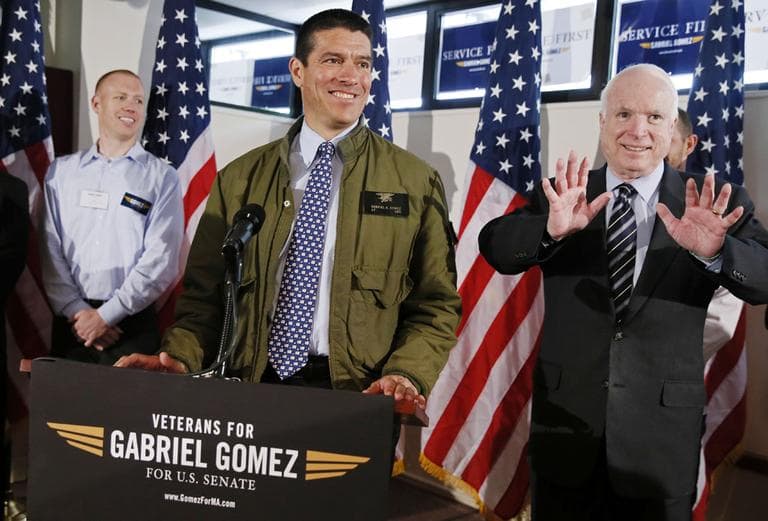Advertisement
With McCain At His Side, Gomez Does A Delicate Dance On Marathon Bombings
Audio report above by WBUR's Fred Thys; text report by WBUR's David Scharfenberg:
BOSTON — The Boston Marathon bombings have presented the candidates for U.S. Senate in Massachusetts with a real conundrum: Grab on to the event that has so galvanized the state or keep it at arms length, for fear of looking opportunist?
Republican Gabriel Gomez did a little of both Monday morning when he stood with U.S. Sen. John McCain before a small group of supporters at a VFW hall in Dorchester.
The McCain appearance was designed, in part, to telegraph that Gomez can be his own man: Here was living proof that a GOP senator can break with a national Republican Party deeply unpopular in Massachusetts.

But the event was also the focal point of Gomez's first extended national security attack on his Democratic opponent, U.S. Rep. Edward Markey.
He hit Markey on several fronts. But his most pointed attack focused on the Democrat's votes against two resolutions honoring the victims of 9/11.
"To me," Gomez said, "it's just unconscionable to have voted against something like that."
If Gomez was willing to put 9/11 front-and-center in the campaign — a move Markey's spokesman later denounced as "despicable" — he handled the more recent, local attacks quite gingerly.
Gomez's mention of the Boston Marathon bombings came early in his speech — and without a jab at Markey.
It was not a direct attack, but a table-setter — a gentle reminder that the national security attacks he was about to launch on his opponent have local relevance.
"Of course we all know that John McCain spent over five years as a prisoner of war undergoing brutal treatment," Gomez said. "The world was a dangerous place back then for our men and women in uniform and today it's still a dangerous world. And it's not just overseas. We were reminded of that five weeks ago today at the Boston Marathon bombings."
He went on to talk about running the marathon himself. And he spoke of the difficulty he had tracking down his family in the immediate aftermath of the bombings.
When WBUR asked Gomez at the end of the event if he was prepared to make the attacks an issue going forward, he made a more explicit link between the bombings and his Markey critique than he had during his speech. But his phrasing suggested the delicate quality of the task.
"The marathon bombings shouldn't be political," he said. "I was there. I was fortunate that my family was fine afterwards. I was fortunate that I was fine afterwards. It's just a reminder that we live in a very dangerous world. And it's a world that Congressman Markey doesn't understand."
The Play
If Gomez's use of the marathon was carefully couched, his attack on Markey for the 9/11 votes was not.
Gomez spoke of two resolutions Markey opposed — one passed in 2004 on a 406-16 vote and another in 2006 on a 395-22 vote.
Markey's campaign had a quick reply: The representative voted for several measures honoring the 9/11 victims, but rejected resolutions larded with Republican talking points on everything from immigration policy to the war in Iraq.
Markey echoed the defense at a campaign event later Monday morning.
"I voted for eight resolutions honoring the 9/11 victims," he said. "I did not vote for the resolutions where the Republicans then stuffed into those resolutions actual statements saying that Saddam Hussein had something to do with 9/11."
That contention isn't entirely accurate — one of the resolutions spoke of "the destruction of two terrorist regimes in Afghanistan and Iraq" after the attacks, but made no direct link between Hussein and 9/11.
Still, Markey made his point: Gomez was politicizing the 9/11 attacks.
And the Democrat took pains to suggest former Vice President Dick Cheney was behind the resolutions — part of a persistent attempt to paint Gomez as a right-wing Republican.
Homeland Security And The Patriot Act
Gomez's take on the 9/11 resolutions is sure to be the headline out of the Monday event. The Republican also hit Markey, though, for backing the Patriot Act after 9/11, then opposing reauthorization a decade later.
“As for the Patriot Act, here’s where his politician DNA got into him a little bit," Gomez said. "First he was for it, then he was against it."
Markey's campaign said he supported the Patriot Act as an emergency measure after the terrorist attacks on the World Trade Center and the Pentagon. But he opposed reauthorization in 2011 because he was concerned about overreach in several areas — including the use of roving wiretaps that might pick up on innocent conversations.
Gomez also criticized Markey for voting against creation of the Department of Homeland Security. Andrew Zucker, a Markey spokesman, said the bill would have given the president too much power to waive the collective bargaining rights of department employees.
It's the sort of down-in-the-weeds detail that's likely to get lost in a low-profile Senate election.
The marathon bombings carry more emotional power. But Gomez has obvious reservations about using the attacks too explicitly. And no matter how he invokes the bombings, it's not clear they can turn the election.
U.S. Rep. Stephen Lynch made the attacks a central issue in the closing stages of his Democratic primary clash with Markey, after all. And that tack didn't work.
With additional reporting by WBUR's Fred Thys
This program aired on May 20, 2013. The audio for this program is not available.